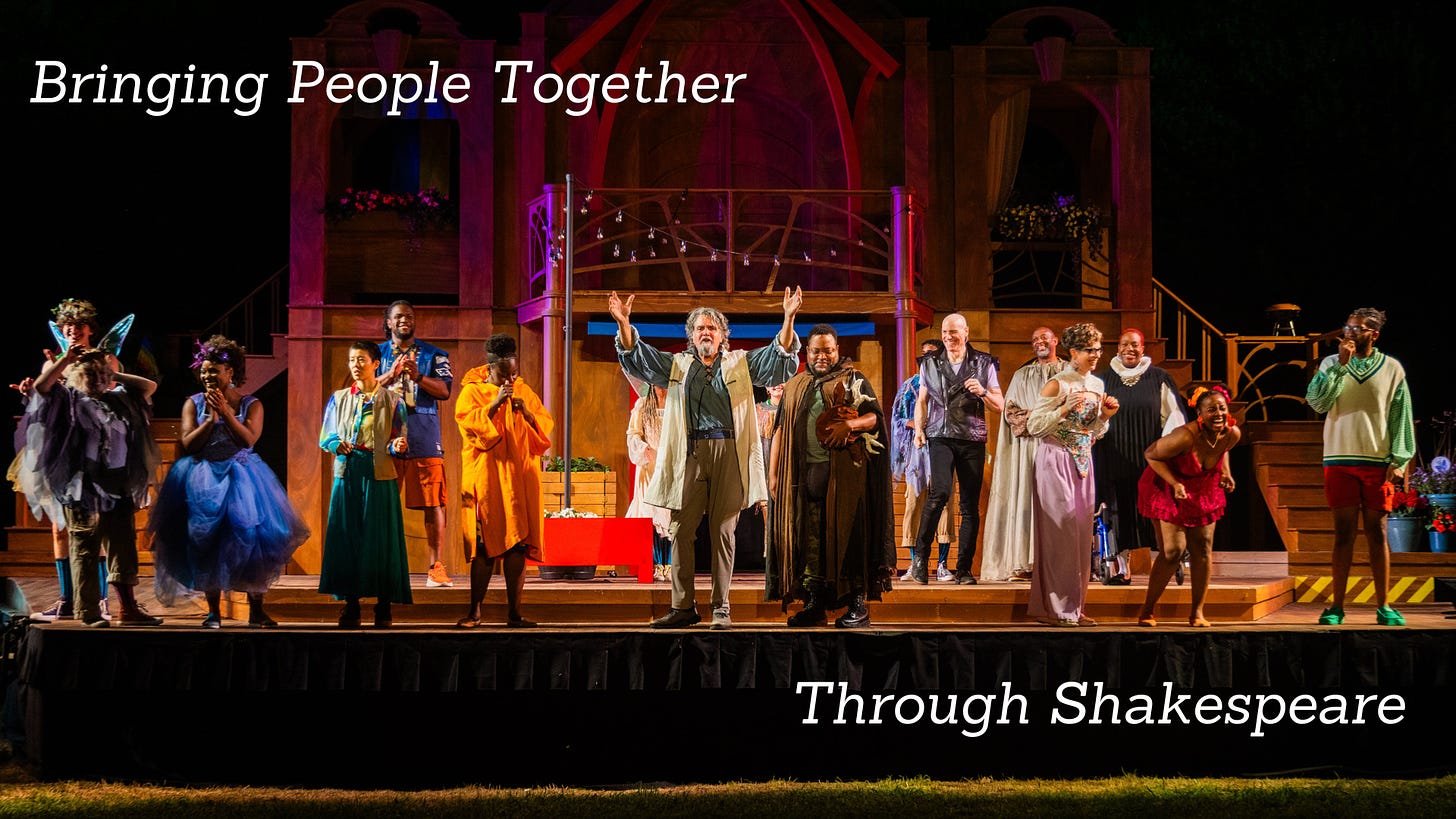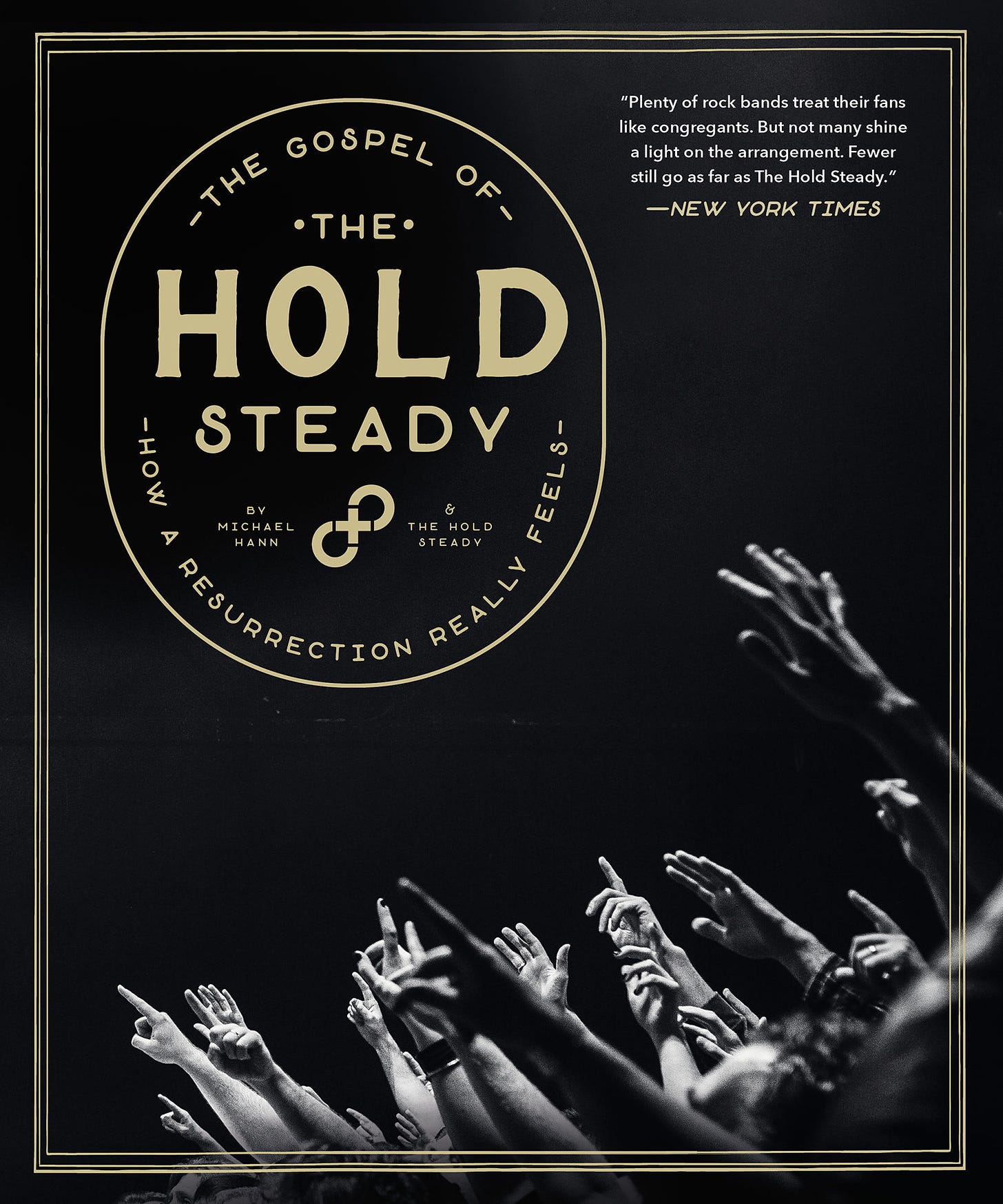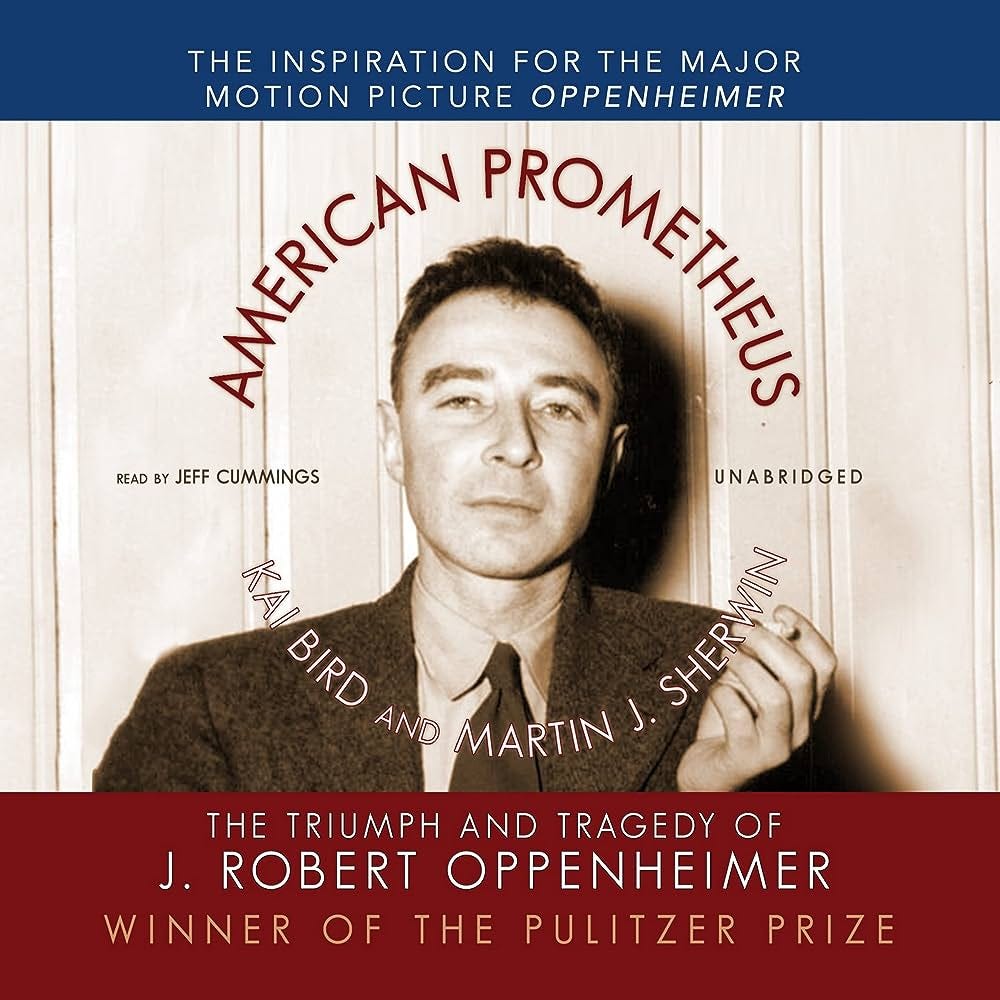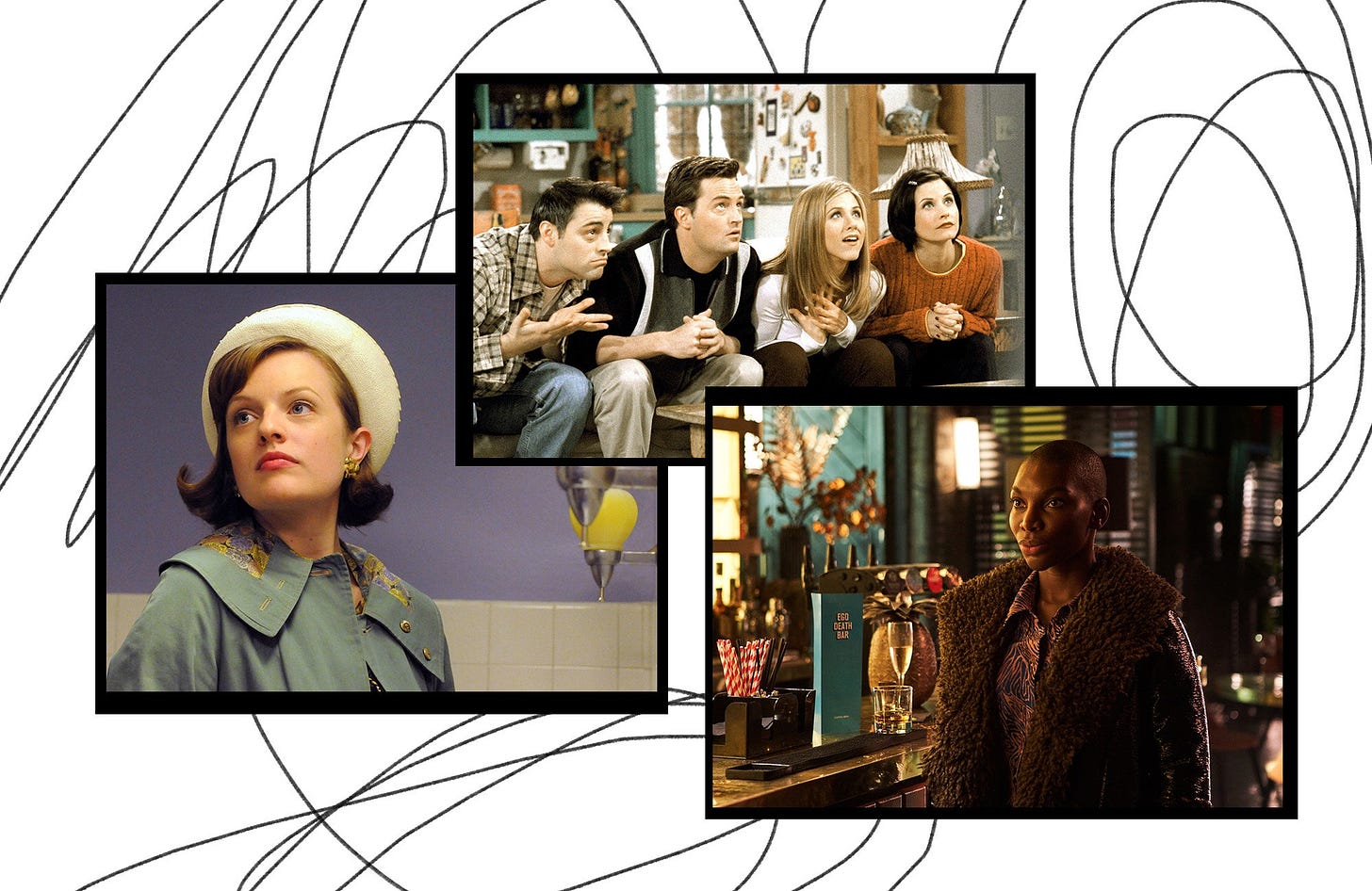Windsor Comes to the Elm City
The Hold Steady, J. Robert Oppenheimer, and 25 years of TV stars walk into a bar...
Last Sunday night, I attended a performance of The Merry Wives of Windsor in New Haven’s Edgerton Park, presented by the Elm Shakespeare Company.
Though the company dates back to 1995, this was my first visit to one of their free outdoor summer performances. Under a star-filled sky and ensconced in my Coleman camping chair, I, Falstaff-like, guzzled wine, gorged on a picnic dinner, and enjoyed the company of friends (and about 150 fellow audience members).
More to the point, I found inspiration in the creativity on stage.
Directed by Dawn Monique Williams with an ear for modern popular music (“Since U Been Gone” by Kelly Clarkson and the theme song from Cheers, to name two unexpected tunes) and an eye for unusual costumes (a New England Patriots jersey makes an appearance), the production infuses one of Shakespeare’s lesser-known comedies with whimsy and fun.

I’ll leave further reviewing to the experts. Critical eyes aside, what has stayed with me the past few days is the joy the cast members radiated out to those of us watching the action from our collapsable chairs.
We got to see Raphael Massie bawdily strutting his way through the role of Falstaff; Abigail C. Onwunali and Liz Daingerfield deliciously exacting comic revenge as the titular wives; and the rest of the cast having a wonderful time, giving contemporary life to words more than 400 years old.
I can’t imagine there’s much compensation for these actors beyond the exhilaration of getting laughs, having the opportunity to display their talents, and sharing the love of their art with appreciative strangers.
Seeing such a display of artistic purity filled me with more admiration and hope than these performers will ever know.
The Best…
…Music Book I Read This Week
The Gospel of the Hold Steady: How a Resurrection Really Feels (Akashic Publishing, 2023) — By Michael Hann & The Hold Steady
He was drunk and exhausted
But he was critically acclaimed and respected
—“Stuck Between Stations,” The Hold Steady
In March 2006, I left the only job I had ever known in my adult life, broke up with a long-term girlfriend, and began a fresh chapter at age 26.
Dominated by 4 a.m. wake-ups to report for work as a producer on NBC’s morning news show TODAY, my lifestyle completely changed. In the process, I made a batch of new friends: similarly sleep-deprived masochists who lived for big stories, the rush of breaking news, and consuming heroic quantities of booze while pumping cash into a jukebox after the show on Friday afternoons.
Looking back, I approached this chapter with remarkable openness. I was receptive to the possibilities offered by meeting new people and having new experiences. It was an exciting (and exhausting) period in my life. What I didn’t realize was that it needed a soundtrack.
Sometime that fall, a TODAY friend named Ryan introduced me to a band called The Hold Steady. They had a new album out called Boys and Girls in America, and he thought I might like it. I said I’d give it a shot.
Loading up my iPod with these 13 new songs, I discovered a group putting forth unapologetically straightforward classic rock riffs (lead guitarist Tad Kubler), tight E Street Band-like rhythms (keyboard player Franz Nikolay, Galen Polivka on bass, drummer Bobby Drake), and an idiosyncratic combination of lyrics and voice (lead singer Craig Finn).
Their style was comfortably familiar yet somehow original. Their songs of debauchery and salvation, of disgrace and redemption, of death and resurrection gave me an immediate jolt of joy.
Ryan was right. I dug them completely and utterly. And maybe I saw a little of our Friday afternoon degeneracy — “drunk and exhausted” (for sure), “critically acclaimed and respected” (we hoped) — reflected in the music.
So yes, I now had my soundtrack.
That particular period lasted almost four years. Since then, I’ve written a few more life chapters, moved across the country and back, changed jobs, changed girlfriends, changed addresses. But The Hold Steady has remained a constant source of happiness and inspiration, particularly when I’ve had the chance to see them live.
(An aside that sums up everything you need to know about being a Hold Steady fan: In April 2014, I, along with Ryan and a friend of his, drove up from New York City to see the band play at the Legendary Toad’s Place in New Haven. About halfway through the set, some sharp, unidentified flying piece of something-or-other nicked me in the face, right below my lower lip. Blood started relentlessly oozing down my chin. Ever the gentleman, Ryan pulled off his undershirt and handed it to me to help stanch the blood. We continued singing along and pumping our fists to the music, as the garment I was pressing to my face quickly turned from a pristine white to a gory, crimson mess. We’re at a Hold Steady show. This is just what we do. The show ended, and I drove us home. By the time I got back to my Chelsea apartment around 2 a.m., the bleeding had stopped. My presence awakened my then-girlfriend, who squinted her sleepy eyes, examined my face, and said, “You… should see a doctor. Right now.” I hopped on the subway and visited an all-night medical clinic downtown where I got a bunch of stitches put in my face. Just another night with The Hold Steady.)
Amazingly, the band has now been around for 20 years. They’ve overcome addiction issues, medical scares, infighting, personnel changes, constant touring in a deathtrap of a van, and a host of other rock & roll problems.
To celebrate, they’ve released The Gospel of The Hold Steady: How a Resurrection Really Feels, a glossy book that’s part-oral history, part-personal essays from writer-fans, part-testimonials from regular fans (also known as members of the Unified Scene). It’s a heartfelt tribute, beautifully rendered by Akashic Publishing.
A few months ago, I produced a show for Connecticut Public Radio that asked how and why some bands were able to defy the odds and stay together. I had hoped to book Craig Finn as a guest to explain The Hold Steady’s improbable longevity. Alas, he was not available to participate, and the show went on without him.
But now, thanks to The Gospel of the Hold Steady, I have all the answers I need.
…Audiobook I Listened to This Week
American Prometheus: The Triumph and Tragedy of J. Robert Oppenheimer (Blackstone Audiobooks, 2007) — By Kai Bird and Martin J. Sherwin, read by Jeff Cummings
When I walked out of Christopher Nolan’s film Oppenheimer a few weeks ago (which I wrote about at the time), I wanted to learn more about the man known as “the father of the atomic bomb.” I was also curious to understand how much of the movie was historically accurate.
So I went directly to the work that inspired the film: American Prometheus: The Triumph and Tragedy of J. Robert Oppenheimer, the Pulitzer Prize-winning book by Kai Bird and Martin J. Sherwin, published in 2005.
(I listened to the audiobook version, read by actor Jeff Cummings, released in 2007.)
My overall takeaway is that Nolan’s film did a remarkable job of condensing a huge life into three hours, rendering the less important parts into impressionistic moments while paying faithful attention to the historical details of key moments.
More than 700 pages long (26+ hours in audio form), American Prometheus leaves little to personal interpretation. Bird and Merwin lay out the story of Oppenheimer’s life in impressive depth and scope — which stands to reason as the book took 25 years to complete.
In addition to the aspects of Oppenheimer’s story that are covered in Nolan’s film, I was also intrigued by several parts that received less — or no — attention on screen.
For example, I was struck by Oppenheimer’s ambivalence toward his own Jewishness as a youngster, illustrated by his education at Manhattan’s Ethical Culture School — which followed the Ethical Culture Society’s philosophy of elevating moral secularism above religion. (My grandmother Janice also attended this school and Oppenheimer’s rejection of Judaism reminded me of hers.) Of course, in a bit of irony, Oppenheimer’s Jewishness would later motivate him to help build what was then the deadliest weapon in human history, aiming to stop Hitler from waging his genocide against Jews.
Another part of the story that surprised me was the degree to which the U.S. state security apparatus spied on Oppenheimer, not only at Los Alamos during the building of the bomb, but also (illegally) for years afterward. Some of this intel, taken out of context and deployed to confirm dubious accusations, was used to justify the claim that Oppenheimer was a pro-Soviet security risk due to his past support of left wing causes and his association with members of the Communist Party. Bird and Merwin exhaustively examine Oppenheimer’s politics and his victimization at the hands of the right-wing anti-Communist hysteria of the 1950s, personified by Sen. Joseph McCarthy.
After more than 26 hours of listening, I was still left wondering why Oppenheimer participated in the 1954 hearing in which the U.S. Atomic Energy Committee (AEC) reviewed his security clearance. (This hearing is a key narrative strand in Nolan’s film.) It was clearly a “kangaroo court,” lacking the legal safeguards of a traditional trial, and was created with the sole intention of humiliating him.
Albert Einstein and others told him to essentially flip the bird to the AEC and U.S. government and walk away from the hearing without giving his right-wing enemies (particularly the odious Lewis Strauss) the satisfaction of ruining his reputation. But Oppenheimer didn’t listen, and Strauss and others destroyed him for it. If I could interview Oppenheimer today, I would ask him why he subjected himself to such an embarrassing ordeal.
One additional note on the production of the audiobook. I am frequently annoyed when narrators mispronounce key names. This is the fault not only of the narrator but also the producers who allow such errors to happen. With American Prometheus, though, I give the production team credit. I could tell that the narrator had done audio fixes throughout the book to replace mispronunciations, particularly for the names Lewis Strauss (STROSS) and Enrico Fermi (FAIR-me). While the edits could have been smoother, I was just happy they got the names right.
…Gimmicky List of Great TV Shows I Saw This Week
“25 Perfect TV Episodes From the Last 25 Years” — By a whole bunch of people at Vanity Fair, August 21, 2023
We’ll end on a lighter note, with Vanity Fair’s list of 25 “perfect” TV episodes from the past 25 years. It’s a fun trip down memory lane and a chance to see how many you’ve seen (I think my number is 17). So many of my favorite series made the list that I’m only mildly miffed that neither Deadwood nor Curb Your Enthusiasm warranted a nod. But hey, there’s always money in the banana stand.




